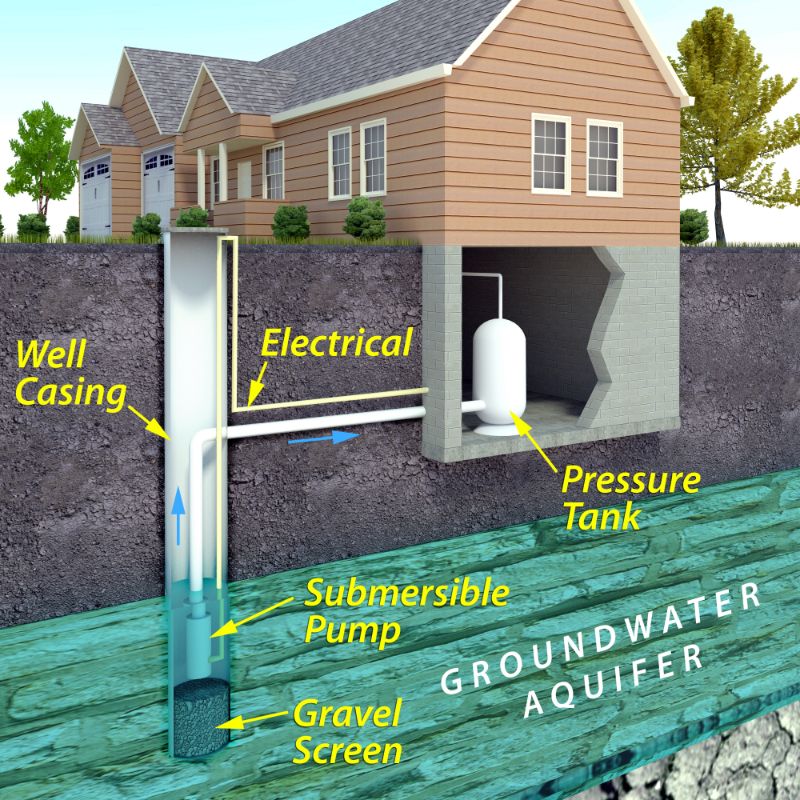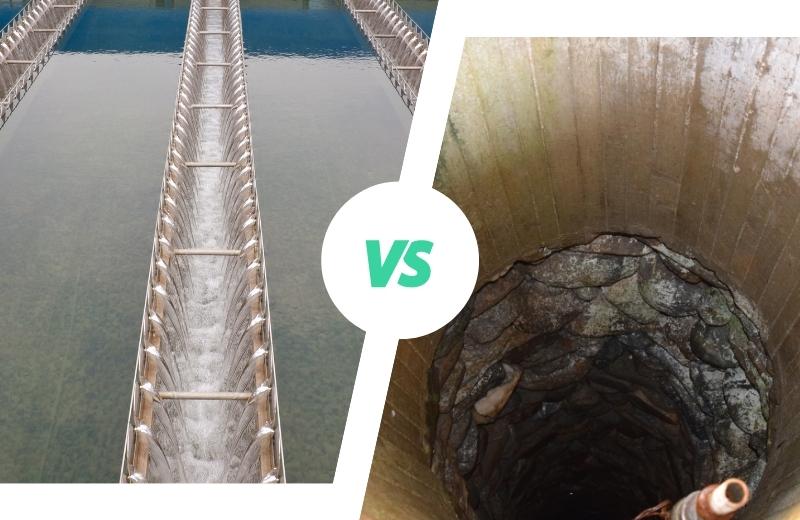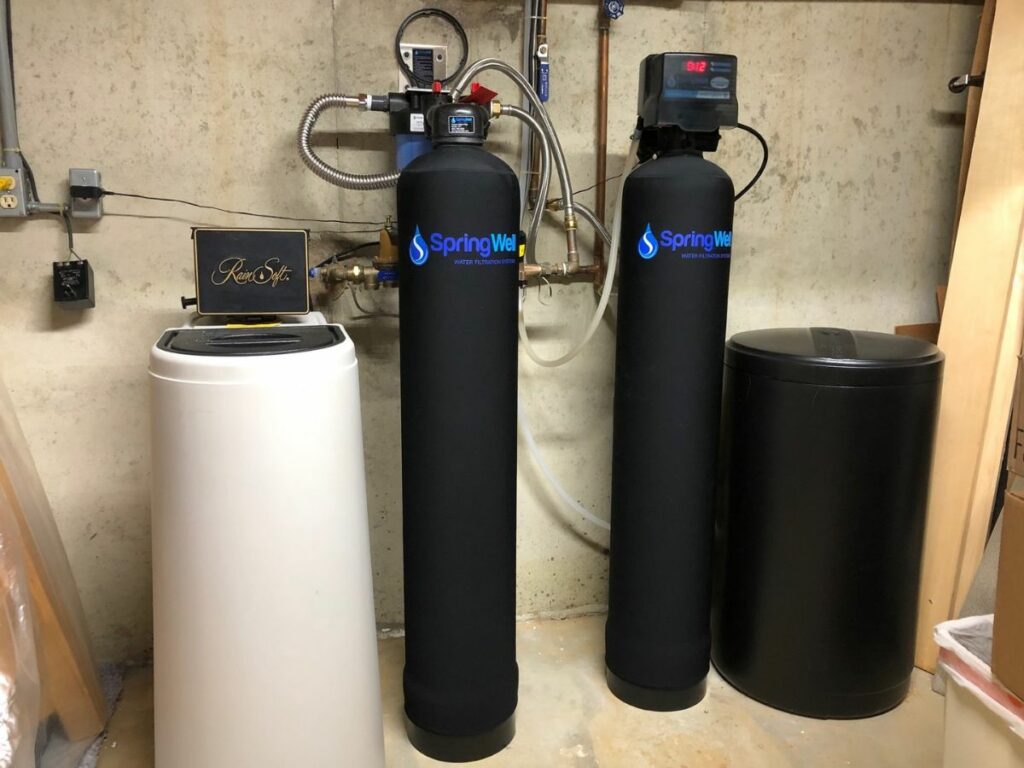Most of us get our water from a municipal supplier – but if you live in a rural region or you have a spare patch of land, you might need to (or want to) consider installing a well.
But what’s best: well water or city water? What are the advantages and disadvantages of both water types? And which is best for you?
You’ll find all the answers to these questions in this well water vs city water guide.
📌 Key Takeaways:
- Well water is groundwater sourced from private wells.
- City water is publicly treated water that’s either sourced from surface (most common) or groundwater supplies.
- Well water is best for folks who want to control how their water is treated and prefer to drink mineral-rich, naturally filtered groundwater, but some people prefer city water because it’s treated for them and a more reliable supply of water.
Table of Contents
📊 Quick Comparison Chart
| Well Water | City/ Municipal Water | |
|---|---|---|
| Treatment responsibility | Well owner | The city |
| May contain contaminants | Yes | Yes |
| Service disruptions possible | No | Yes |
| Electricity required | Yes | No |
| Monthly water bill | No | Yes |
| Risk of contamination during natural disaster | Low | High |
🏠 What is Well Water?
Well water is sourced from a private well and comes directly from the earth.
A well is made by drilling a hole in the ground to reach a layer of permeable rock known as the underground aquifer. A pump system is used to transport the water up to your home.
Unlike city water, well water doesn’t come from a public treatment center. It’s not disinfected with chemicals to eliminate harmful pathogens.
However, water in wells is naturally filtered to some extent by the rock and soil layers it moves through. Many well owners use a well water filter to remove the most common well contaminants and protect against microorganisms just in case.
👨🔬 Well water isn’t regulated by the Environmental Protection Agency (EPA) Quality Guidelines. If your property comes with a private well, you’ll take on the responsibility of testing your well for certain impurities, and treating it accordingly.

Advantages of Well Water
Here are some of the reasons to consider well water for your home:
- No monthly water bill. A private well isn’t connected to a public water supply – it’s part of your property. That means you don’t have to pay to use your water, which is a major benefit of well water.
- No disruptions to your water supply. Owning a private well gives you more control over when maintenance will be performed, so you won’t unexpectedly be left without water. Plus, underground aquifers are more protected from natural disasters than surface water bodies and the water only has to travel from your backyard.
- Healthier, tastier drinking water. Well water is free from disinfection chemicals and often contains high levels of minerals with health benefits, like calcium and magnesium. Chlorine-free, mineral-rich water typically tastes pleasant and alkaline.
- You have control. With your own private well, you can control what it tastes like and what it contains. You know exactly where your water comes from, and you can invest in filtration equipment to treat it as you like. You don’t rely on city resources, and you know for sure how water gets to your home, so you can avoid drinking lead in your water.
Continue Reading: A Deep Dive Into the Benefits of Well Water
Disadvantages of Well Water
There are a few setbacks of drinking water from a well:
- Needs electricity. While you won’t have to pay water bills for well water, you will have to foot the electricity costs for the well water pump. Plus, if you have a power cut, your access to your well’s water will be cut off unless you have a backup generator.
- Not guaranteed to be clean. Well water is untreated and may contain naturally occurring contaminants. These contaminants may leave stains across your whole house or affect your water’s taste or smell. You may need to buy filtration and water softener solutions that treat hard water minerals and filter common impurities that contaminate well water like iron, sulfur and bacteria. This comes at a cost.
- It’s your responsibility. In some ways, the freedom of owning your own well is a benefit. But in other ways, it can be a hassle. It’s your job to schedule regular well water tests for water quality, maintain your filtration systems, and arrange for maintenance or damage repair. It’s important that you understand what you’re responsible for as a private well owner.
- Water may be contaminated. A well water system is susceptible to contamination, especially if the well is located near your own septic system or septic tank, an underground storage tank, or farm. Sewage and waste leakage, rainwater, and dead animals can all contaminate a well. You’ll need to filter your well water to remove microorganisms like bacteria or pollutants such as nitrates.
🏢 What is City or Municipal Water?
If you live in a municipality, you’ll most likely receive potable water from your local authority. You pay for this water, and it’s available whenever you turn on your tap.
City water comes from streams, lakes, rivers, or wells. The most common source of city water is surface water (water that sits on the earth’s surface, not below).
Municipal water is treated with chlorine before it’s sent through underground pipes into our homes. Tap water doesn’t contain harmful contaminants like coliform bacteria – although it does contain disinfectant chemicals.
City water is safe to drink according to EPA Standards, but it still contains traces of chemicals, heavy metals, and other pollutants.

Advantages of City Water
Here’s why some folks enjoy being on city water systems:
- Convenient. You should always have instant access to your city water. Public water systems tend to be very reliable (with the exception of natural disasters), which should give you peace of mind if you like to always be prepared.
- No-hassle tap water. You don’t need to pay to get your city water tested or to install a filtration system if you don’t want to. The sourcing, testing, and treatment of your city’s water supply are handled by your local authority.
- Already disinfected. On the same note, you won’t need to disinfect municipal water because it has already undergone chemical treatment at the treatment center. This saves both time and money.
- Easier to sell your home. Your property value tends to be higher if you have a reliable city water supply. Plus, you should find it easier to get a loan from a mortgage lender.
Disadvantages of Municipal Water
There are a few disadvantages of municipal water that you should also know about.
- Contains harsh chemicals. The EPA regulates chlorine use in city water, and the current accepted level is 4 parts per million (PPM). But even low levels of disinfection chemicals can have health effects, and you may not want to drink them at all.
- May contain traces of contaminants. Just because city water is treated to kill viruses and bacteria such as E. Coli, that doesn’t mean it’s free from traces of contaminants and pollutants like heavy metals, radium, pesticides, and fluoride. These come from factories, nuclear power plants, and farms.
- Out of your control. The quality of your city water is controlled by your local authority. You don’t have a say in how your water is disinfected, and you’ll need to remove the likes of chlorine and fluoride yourself if you don’t like that they’re added to your water. You also don’t have control over how your water gets to your home – it may, for instance, pass through lead pipes.
- Pay monthly water bills. To receive city water, you’ll need to be paying monthly water bills. Your bills can rack up if you have a big family and multiple bathrooms.
🤔 City Water vs Well Water: Which is Better?
So, comparing well water vs city water, which is best?
The best type of water for you depends on what level of control – and therefore responsibility – you’d like to have when it comes to your drinking water source.
Let’s take a look at the key differences between city and well water, and which water type is best in each area.
Responsibility & Maintenace
When it comes to your responsibility as a homeowner, you’ll need to do much more when you have a well.
If you’d rather have control over your water supply, and you don’t mind the extra responsibility of regularly testing and treating your water, well water is best.
If you prefer to have on-demand water with more reliability, and you don’t want the hassle of maintaining your water source, city water is best.
Contaminants & Quality
Both well water and city water supplies usually contain contaminants, but the types of contaminants differ.
City water has been treated, so you don’t necessarily need a filtration system to benefit from clean water in your whole house (unless you want to eliminate harmful chemicals and trace levels of pollutants).
Well water often contains natural minerals and metals, and may become contaminated from outside sources, like nearby sewers or septic tanks. It’s your responsibility to test for these contaminants and treat your water accordingly.
Both well water and city water contain hard water minerals, so you may need to install a water softener in both instances.
Neither well water nor city water is best, here – you’ll probably receive mildly contaminated water from either source.

Emergency Preparation
A natural disaster could cause your city water to become contaminated or cut off your supply of water.
If you have a well, you need to think about how your water safety might be affected by the requirement for electricity. Your well pump and other components may also be damaged by a disaster such as an earthquake.
There are risks to both well and city sources in this case. It’s best to have an emergency supply of water in your home as a precaution.
Ongoing Costs
Considering cost, you may find the idea of a monthly water bill less appealing than the costs of owning a house with a well.
You’ll need to pay a monthly bill with city water, whereas a well water system will require larger, less frequent bills for maintenance, pump and pressure tank replacements, and water testing.
It’ll still likely work out cheaper in the long run to own a well, so well water is best if you want to save money.
📊 How To Improve Your Water Quality
Whether you have well water or city water, it’s likely that your water isn’t perfect.
Well water is usually very hard and often contains contaminants like iron, sulfur, manganese, sediment, and tannins. City water contains disinfectants, pollutants, and other common surface water contaminants, and may also have hardness issues.
There are a few methods of improving your water quality, depending on the issue:
- Cartridge filters, such as activated carbon filters, KDF filters, and ceramic filters. These filters remove a range of physical contaminants from water and are found in countertop units, under-sink systems, pitchers, faucet filters, whole house water filter systems, and more.
- Backwashing filters, such as air or chemical oxidation filters. These filters oxidize and remove contaminants like iron, manganese, and sulfur.
- Water softeners or water conditioners. These systems are installed at water’s point of entry into your home and remove hardness minerals or crystallize them, preventing scale formation in your home’s plumbing system.
- UV purifiers, which disinfect water using ultraviolet light. They’re most commonly sold as add-one to whole home filters.

Check out our guide on how to choose a water filter system if you want to know more about how to pick the right solution to treat your city or well water.
❔ City Vs Well Water: FAQ
Is well water or city water better?
There is no clear winner in the city vs well water comparison. City water is better for you if you prefer a consistent, reliable, hassle-free drinking water solution, but well water is better if you prefer to drink naturally filtered groundwater and control how your water is treated.
Why is city water better than well?
Some people think city water is better than well water because it has been disinfected to kill microorganisms like bacteria and viruses. However, well water has benefits, too, including a natural mineral content and a lack of contaminants that are commonly found in city surface water supplies, like pesticides and other pollutants.
What is healthier, well water or city water?
Well water is generally healthier than city water because it contains a higher concentration of healthy minerals and doesn’t contain health-harmful surface water pollutants or chemical disinfectants. However, some well water supplies contain high levels of unhealthy contaminants, like arsenic, chromium, and other heavy metals. You can use a water filtration system or combination of filters to remove these contaminants and improve water quality.
